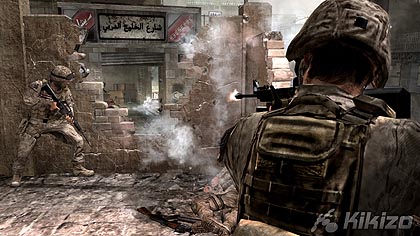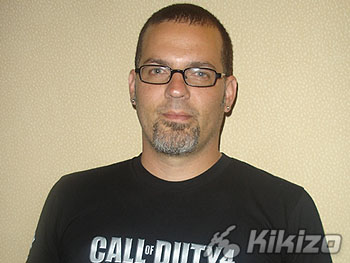Making Modern Warfare: COD4 Interview
As Call of Duty 4 hits stores, we bring you this behind the scenes launch feature with Infinity Ward president Grant Collier, producer Mark Rubin, and military advisor Hank Keirsey, for some interesting views on the politics and production of Modern Warfare - real-world, and in-game.
Page 2
Rubin: Who's a big, huge, behemoth bad guy that we can fight against? It's not going to be guys with machine guns running around in T-shirts and jeans, that's not Call of Duty. So we knew from the start of Modern Warfare that we needed to do a fictional conflict. It's totally fictional, we're not trying to be political, we don't care, we're not being religious or anything of that sort. The basic main enemy is Russian; our main portrayed bad guy is Zakhaev, who's a hardline communist in Russia and wants to bring back the old Soviet; he's really depressed about how the country's been coming downhill and how he feels it's been corrupted, and he wants the big Soviet Union back. So he's working on a coup in Russia, a military takeover, and they're going to take over some key military sites.
Now the 'world', in our fictional game, is mostly at peace, so he knows he needs to get the attention off of what he wants to do, so he works with Al-Asad who has his own hardcore views about creating his own military presence in the Middle East in some unnamed country. It's also much more story-driven and hopefully much more interesting than previous Call of Duties in the way that it all comes together and the way it diverts and accumulates at the end. We set it up so that it's obviously there's a military coup that's extremely harsh. It's not religious based; you see citizens in the street getting their houses searched and arrested, we're going in to stop it and in the story you find out what's actually going on and so on. If you don't play a single character the whole way through then the game is more about the people around you, you're a soldier with the main star, in the Marines and the SAS.
Kikizo: Is there any airborne combat in the game? The trailers hinted that there might be.
Collier: Yes. There's one segment of the game, as an example where you're the gunner on an AC-130 Spectre Gunship - if you've seen Transformers, they had the AC-130 going around - you get to be a gunner and it's pretty fun. You want me to tell you everything that's in the game?! The guy gets the girl?!
Kikizo: We've noticed quite dramatic light and dark contrasts in the game, is this going to come into the gameplay?
Collier: Yes. We've spent a lot of time with lighting, it's hugely important to us. We have characters casting dynamic shadows, they have really robust self-shadowing. You can actually, if you're in the right area - say a building where the top floor is dark but maybe the sidewall is blown in and there's light shining in - he's running up the stairs and actually casts a shadow. So even though he's sneaking up the stairs, you can actually see his shadow come up and kill him before he gets up stairs. There's a lot that were doing with shadows and light. There's another thing we've got called rim lighting; the photocells in the human eye can pick up movement in darkness. Let's say you're out camping and you see someone running around in the forest, you may not know that's a person but you can detect that movement even though it's pitch black. So in an effort to increase our immersion we've actually tried to mimic how the human eye sees that by having this rim lighting, so light sources will bend around the characters t a certain extent and allow them to have a little bit of pop when they're moving in darkness. You'll see PC players do is turn their gamma right up when they're playing dark levels so it's almost like daylight! But we have light and dark for a reason, we want gamers to really play the way that we've designed the game, so as to not handicap players when they're playing the game.
Kikizo: What were the actual developmental uses to you of the multiplayer beta?
Collier: Just doing a really big multiplayer game for a thirdparty is extremely difficult. I don't know if you can really name a thirdparty console multiplayer game that didn't have trouble at launch. For the firstparties, they've moved heaven and earth in their backbone to make sure that everything runs and they don't look bad. But they don't necessarily have the same tenacity when it comes to every other thirdparty game out there. And every single thirdparty says we're going to be the best thing since sliced bread. When we shipped with COD2, the very next day Microsoft changed their firmware and it broke the game online - if it had been a firstparty game, they wouldn't have done that. So there was a lot of work that we had to go through to modify the game, and at that point, we had everyone and their grandmother trying to go online, which made it very difficult. And I think COD3 had some problems with their online multiplayer. So we really are determined to get in with these firstparties, and when we launch the game, to not have these kinds of issues. We want to launch like a firstparty game.
Kikizo: Talking about graphics now, to me it didn't make much sense when Bungie told everyone not to judge Halo 3's graphics based on the multiplayer beta. COD4's multiplayer beta looked awesome, and I think for an FPS that's this fast paced, 60fps is essential. You guys have said that you took anything out that made the game go below 60. Why do some developers respect the need for 60fps where others do not?
Rubin: I agree with you [re: view on Bungie's comment]. I think your game should look good any time. And it should be 60fps. They were neither, I thought. And there is not as much going on on-screen as in COD4. We have little tiny objects all over the ground, when an explosion goes off you can truly feel it. But multiplayer looks as good as singleplayer.
Collier: It's sort of like when people were developing for old consoles and there were a lot of memory constraints. You just got to be good when you understood that you were living in this box. So when we had everyone understand that we were going to run at 60fps, and that was it, they just started to think in different ways, and were able to achieve a lot of different things while staying at 60fps. It's just, they hit the ceiling but they wanted more; so what kind of tricky things could we do to get that special sauce in there and still stay beneath the ceiling, if that makes sense.
Kikizo: Now that the game is launching, what special ingredients are you adding to make the community experience better?
Collier: Just speaking to the game itself and not any of the exterior stuff that we're doing, we have an in-game party system, so now people can jump into a game together, they don't have to always be the host, they can kick people out until all their friends join. You can unlock the ability to clan tags, so instead of everyone making their name all funky, they can have a clan tag that they can pull on, they don't have to get rid of their names on their profile together. There's also the ability to join games in progress; you're having fun with your friends playing as a team, and people start quitting out of the enemy team, and it just kills the game, but you have new people coming in there. We also have matchmaking so that your spot is being matched with people with comparable skill levels. So that's all inside the game but we also have our CharlieOscarDelta community site, which is pretty huge, five times what any other Activision community site is at. We have an in-house community manager who is working on clans, tournaments, and all that stuff. So we're going a lot deeper with COD4 that we have with any other title.











 Satoru Iwata Video Interview - the late Nintendo president spoke with Kikizo in 2004 as 'Nintendo Revolution' loomed.
Satoru Iwata Video Interview - the late Nintendo president spoke with Kikizo in 2004 as 'Nintendo Revolution' loomed. Kaz Hirai Video Interview - the first of Kikizo's interviews with the man who went on to become global head of Sony.
Kaz Hirai Video Interview - the first of Kikizo's interviews with the man who went on to become global head of Sony. Ed Fries Video Interview - one of Xbox's founders discusses an epic journey from Excel to Xbox.
Ed Fries Video Interview - one of Xbox's founders discusses an epic journey from Excel to Xbox. Yu Suzuki, the Kikizo Interview - we spend time with one of gaming's most revered creators.
Yu Suzuki, the Kikizo Interview - we spend time with one of gaming's most revered creators. Tetris - The Making of an Icon: Alexey Pajitnov and Henk Rogers reveal the fascinating story behind Tetris
Tetris - The Making of an Icon: Alexey Pajitnov and Henk Rogers reveal the fascinating story behind Tetris Rare founders, Chris and Tim Stamper - their only interview? Genuinely 'rare' sit down with founders of the legendary studio.
Rare founders, Chris and Tim Stamper - their only interview? Genuinely 'rare' sit down with founders of the legendary studio. The History of First-Person Shooters - a retrospective, from Maze War to Modern Warfare
The History of First-Person Shooters - a retrospective, from Maze War to Modern Warfare